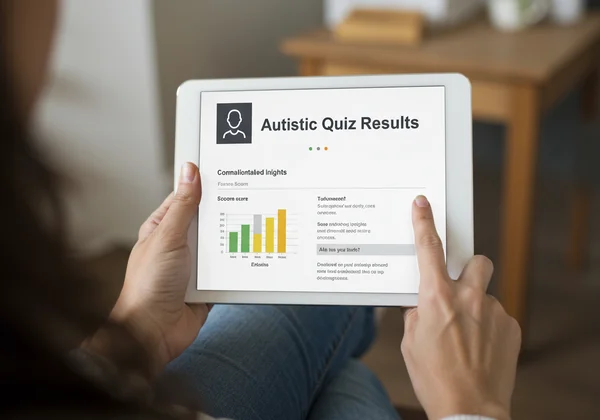Resultados de Questionário para Autismo: Próximos Passos para o Autoconhecimento
July 21, 2025 | By Phoebe Harrington
É perfeitamente normal sentir uma mistura de emoções após fazer um questionário online sobre autismo – talvez validação, confusão ou uma faísca de curiosidade sobre o que tudo isso significa. Este momento marca um passo significativo em sua jornada de autoconsciência. Então, o que fazer após fazer um questionário sobre autismo? Este guia irá ajudá-lo a navegar pelos resultados do seu questionário sobre autismo e a impulsionar seus próximos passos neste caminho único. É mais do que apenas uma pontuação; é o início de uma conversa mais profunda consigo mesmo.
Seus resultados são um ponto de partida, uma chave que pode desbloquear um novo nível de compreensão sobre como você experimenta o mundo. Seja você apenas explorando seus traços ou buscando respostas para perguntas de toda a vida, você veio ao lugar certo. Para começar esta jornada de reflexão, você sempre pode explorar seus traços em nossa plataforma. Estamos aqui para apoiá-lo com ferramentas confiáveis e baseadas em ciência, projetadas para o autoconhecimento.
Compreendendo Seus Resultados do Questionário sobre Autismo
O primeiro passo após receber seus resultados é processá-los de uma maneira saudável e informada. Os números e descrições podem parecer avassaladores, mas são simplesmente ferramentas para ajudá-lo a se ver com mais clareza. Lembre-se, trata-se de compreensão, não de julgamento.
Interpretando Sua Pontuação: O Que os Números Podem Indicar
Ao completar um questionário para autismo, como o CAT-Q (Questionário sobre Traços de Camuflagem Autista), você receberá uma pontuação. É importante entender que essa pontuação não é um rótulo definitivo. Em vez disso, pense nela como um indicador. Uma pontuação mais alta pode sugerir que você possui um número significativo de traços autistas, como padrões na comunicação social, sensibilidade sensorial ou uma tendência ao que é conhecido como mascaramento autista.
Mesmo uma pontuação mais baixa não invalida seus sentimentos ou experiências, pois o autismo se manifesta de maneira diferente em cada pessoa, e uma ferramenta de rastreio não pode capturar todas as nuances. Sua pontuação é uma peça do quebra-cabeça, não a imagem completa. Para uma análise mais detalhada, nossos relatórios aprimorados de IA podem ajudar a traduzir sua pontuação em insights personalizados sobre seus pontos fortes, desafios e como esses traços podem impactar sua vida diária, oferecendo uma profundidade que um simples número não consegue. Este relatório personalizado é um excelente próximo passo para uma compreensão mais profunda.

Questionários Online vs. Diagnóstico Clínico: Principais Diferenças a Saber
Este é o ponto mais crítico a ser compreendido: um questionário online é uma ferramenta de rastreio, não um diagnóstico clínico. Nosso objetivo é fornecer um primeiro passo seguro e perspicaz para a autoexploração, não substituir o papel crucial de um profissional de saúde. Um diagnóstico formal só pode ser dado por um profissional qualificado, como um psicólogo clínico ou psiquiatra, após uma avaliação abrangente.
Essa avaliação geralmente inclui entrevistas detalhadas sobre seu histórico de desenvolvimento, avaliações observacionais e uma discussão de suas experiências pessoais. Uma ferramenta online como um questionário de autoavaliação para autismo é uma maneira acessível e de baixa pressão para coletar informações e decidir se buscar uma avaliação formal é o caminho certo para você. Ela o capacita com conhecimento para iniciar uma conversa mais informada com um profissional.
Navegando Seus Próximos Passos na Autodescoberta do Autismo
Seus resultados do questionário são um catalisador para o que vem a seguir. É aqui que a jornada de próximos passos no autoconhecimento do autismo realmente começa. Você está no controle deste processo e pode avançar no ritmo que se sentir confortável.
Aprofundando Sua Compreensão: Mais Pesquisa e Recursos
Agora que você tem essa visão inicial, é um ótimo momento para aprofundar sua compreensão. Mergulhe em recursos criados por e para a comunidade autista. Leia livros e blogs de autores autistas, assista a vídeos de criadores neurodivergentes e ouça podcasts onde pessoas autistas compartilham suas experiências vividas. Isso fornecerá contexto e perspectiva do mundo real que as descrições clínicas muitas vezes não oferecem.
Aprender sobre conceitos como burnout autista, perfis sensoriais e interesses especiais (ou "spins") pode ser incrivelmente validante. Você pode encontrar explicações para coisas que sentiu a vida toda, mas não conseguia expressar em palavras. Esta pesquisa é um ato poderoso de autocuidado e afirmação. Comece sua jornada com um confiável questionário de autismo para adultos para guiar sua pesquisa inicial.

Considerando uma Avaliação Profissional para Traços Autistas
Após fazer sua própria pesquisa, você pode decidir que deseja a clareza de um diagnóstico formal. Considerar uma avaliação profissional é uma escolha pessoal. Para alguns, um diagnóstico é validante e fornece acesso a suporte e acomodações. Para outros, a autoidentificação com base em pesquisa aprofundada e conexão com a comunidade é suficiente.
Se você optar por buscar uma avaliação, procure profissionais que se especializem em neurodiversidade em adultos, particularmente em seu grupo demográfico (por exemplo, mulheres ou adultos mais velhos), pois a apresentação de traços pode ser diferente. Prepare-se para sua consulta documentando suas experiências e levando seus resultados do questionário como ponto de partida para a conversa. Isso pode ajudá-lo a se defender de forma eficaz. Nossa plataforma pode ser o primeiro passo para organizar seus pensamentos.
Encontrando Suporte e Construindo Sua Comunidade Autista
Você não está sozinho nesta jornada. Um dos passos mais poderosos que você pode dar é conectar-se com outras pessoas que compartilham experiências semelhantes. Encontrar sua comunidade pode ser uma parte transformadora de abraçar sua identidade neurodivergente.
Conectando-se com Comunidades e Grupos de Apoio ao Autismo
Procure grupos online, encontros locais e fóruns que sejam explicitamente comunidades de apoio ao autismo. Isso significa que são espaços onde o autismo é visto como uma variação natural da mente humana, não como um déficit a ser curado. Nessas comunidades, você pode compartilhar experiências, pedir conselhos e aprender estratégias de enfrentamento com pessoas que realmente entendem.
Conectar-se com comunidades de apoio ao autismo permite que você "desmascare" em um ambiente seguro, livre da pressão de cumprir expectativas sociais que podem estar te esgotando. Ouvir um "eu também" de outra pessoa pode ser uma das experiências mais curativas neste caminho. Esta é uma parte fundamental de encontrar apoio no autismo.

Priorizando o Autocuidado e Gerenciando o Burnout Autista
Muitos adultos que suspeitam ser autistas têm um longo histórico de superar desconfortos, levando a um estado de profundo esgotamento conhecido como burnout autista. Isso não é apenas sentir-se cansado; é um estado debilitante de exaustão mental, física e emocional que pode levar à perda de habilidades e aumento da sensibilidade.
Priorizar o autocuidado é essencial. Isso pode parecer diferente para você do que para pessoas neurotípicas. Pode significar agendar tempo livre para se recuperar de eventos sociais, usar fones de ouvido com cancelamento de ruído para gerenciar a sobrecarga sensorial ou permitir-se engajar plenamente em seus interesses especiais sem culpa. Entender suas necessidades únicas é a melhor forma de autocuidado, e um questionário sobre burnout autista pode ser um bom ponto de partida para a autorreflexão. Deixe-nos ajudá-lo a entender suas necessidades.
Sua Jornada Capacitada Após um Questionário sobre Autismo: E Agora?
Fazer um questionário sobre autismo é mais do que apenas responder perguntas; é um ato de coragem e autodefesa. Seus resultados não são um ponto final, mas uma porta para uma vida mais autêntica e empoderada. Agora você tem uma estrutura para entender seu passado, navegar seu presente e construir um futuro que honre seu verdadeiro eu.
Continue curioso, seja compassivo consigo mesmo e lembre-se de que esta é a sua jornada. Quer você opte por buscar um diagnóstico, conectar-se com a comunidade ou simplesmente usar esse conhecimento para o crescimento pessoal, você está avançando em direção a uma vida de maior compreensão e aceitação. Encorajamos você a continuar esta exploração e a descobrir seus resultados com mais detalhes em nossos relatórios personalizados.
Perguntas Frequentes Sobre Resultados de Questionários sobre Autismo
Um questionário online sobre autismo oferece um diagnóstico?
Não, um questionário sobre autismo online é uma ferramenta de rastreio, não um instrumento diagnóstico. Ele pode indicar a presença de traços autistas, mas não pode substituir uma avaliação abrangente por um profissional de saúde qualificado. Pense nisso como um primeiro passo útil em uma jornada de autodescoberta.
O que devo fazer se os resultados do meu questionário sobre autismo parecerem corretos para você?
Se seus resultados parecerem corretos, o melhor próximo passo é aprender mais. Explore recursos de criadores autistas, leia sobre experiências vividas e conecte-se com comunidades afirmativas. Você pode usar essa nova compreensão para tomar decisões que melhor apoiem seu bem-estar. Um questionário de autoavaliação para autismo pode ser o catalisador perfeito para esse mergulho mais profundo, e você pode começar sua jornada em nosso site.
Como posso encontrar apoio profissional após fazer um questionário sobre autismo?
Para encontrar apoio profissional, procure psicólogos clínicos ou psiquiatras em sua área que se especializem em neurodiversidade em adultos ou condições do espectro autista. Diretórios online de organizações nacionais de autismo podem ser um ótimo recurso. Leve seus resultados do questionário e anotações pessoais para sua consulta para ajudar a guiar a conversa.